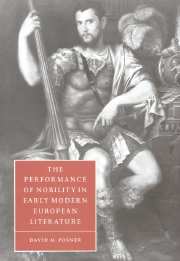Book contents
- Frontmatter
- Contents
- Acknowledgments
- 1 Introduction: “The Noble Hart”
- 2 Montaigne and the staging of the self
- 3 Mask and error in Francis Bacon
- 4 Noble Romans: Corneille and the theatre of aristocratic revolt
- 5 La Bruyère and the end of the theatre of nobility
- Notes
- Bibliography
- Index
- Cambridge Studies in Renaissance Literature and Culture
2 - Montaigne and the staging of the self
Published online by Cambridge University Press: 22 September 2009
- Frontmatter
- Contents
- Acknowledgments
- 1 Introduction: “The Noble Hart”
- 2 Montaigne and the staging of the self
- 3 Mask and error in Francis Bacon
- 4 Noble Romans: Corneille and the theatre of aristocratic revolt
- 5 La Bruyère and the end of the theatre of nobility
- Notes
- Bibliography
- Index
- Cambridge Studies in Renaissance Literature and Culture
Summary
“La plus part de nos vacations sont farcesques. ‘Mundus universus exercet histrioniam.’” Few authors know better than Montaigne how to conceal the profound behind the platitude. When he makes this remark in “De mesnager sa volonté,” the tenth essay of the third book of his Essais, he is perfectly aware that he is recycling a truism already old in the time of Petronius. Indeed, he cites the Roman author's version of this commonplace almost as an anti-authority, as if to emphasize the triteness of his own statement. Yet at the same time he does not mean his remark to be merely banal; it provides both Montaigne and his reader with an enormously powerful metaphor, one which functions both as a tool with which to explore the structure of the self and as a figurative vocabulary with which to describe the dynamics of that structure, once discovered. The set of metaphoric images here conjured up – stage, role, performance, mask – permeate Montaigne's language of the self, a language not incidentally appropriated by the majority of his readers. Given the critical attention lavished by such readers as Villey, Friedrich, and Starobinski upon Montaigne's ideas of identity, we certainly shall not attempt here to come up with yet another all-encompassing Theory of Montaigne.
- Type
- Chapter
- Information
- Publisher: Cambridge University PressPrint publication year: 1999



